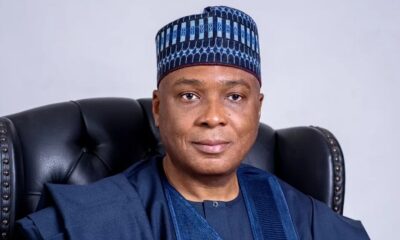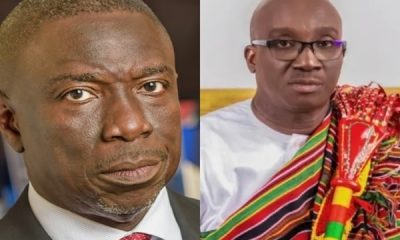Economy
CBN targets single-digit inflation in three years

The Central Bank of Nigeria (CBN) has set its sights on reducing inflation to a single digit in the medium to long term, following the recent rebasing of the Consumer Price Index (CPI) and subsequent decline in inflation to 24.48 per cent.
CBN Governor, Dr Olayemi Cardoso, who spoke yesterday at a press briefing after the first Monetary Policy Committee (MPC) meeting of 2025, reiterated the apex bank’s commitment to orthodox monetary policies, noting that the positive outcomes so far indicate that inflation is trending downward.
He said that after two days of deliberation, the MPC decided to maintain all key monetary policy parameters, including the Monetary Policy Rate (MPR) at 27.50 per cent, the asymmetric corridor around the MPR at +500/-100 basis points, the Cash Reserve Ratio (CRR) at 50.00 per cent for Deposit Money Banks and 16.00 per cent for Merchant Banks, and the Liquidity Ratio at 30.00 per cent.
Clarifying the impact of the rebased CPI, Cardoso explained that the lower inflation figure should not be misinterpreted.
He underlined the need to analyse more data before drawing comparisons, noting that the CBN is currently assessing the figures and will provide further guidance in due course.
Despite the complexities, he pointed out that inflation is gradually declining, supported by the recent stability and appreciation of the foreign exchange rate, with the differential between the official and parallel markets now less than one percent.
He stressed the critical importance of collaboration between monetary and fiscal authorities in sustaining recent economic improvements.
He cited the recent Monetary Policy Forum as an example, where stakeholders from the organised private sector, Bureau de Change operators, and government representatives, including the Minister of Finance, participated.
Cardoso noted that both sides are committed to deepening their dialogue and holding regular meetings to address key economic issues proactively.
Addressing concerns about the impact of elevated borrowing costs on economic growth, the CBN Governor assured that the apex bank’s primary objective is to stabilize the foreign exchange and financial markets.
He expressed confidence that such stability would attract increased foreign investments, stimulating the much-needed economic growth.
He also highlighted the competitiveness of the Nigerian currency, which has spurred growing interest from international investors.
Cardoso said that improved oil production, reaching 1.54 million barrels per day by the end of January 2025, would strengthen Nigeria’s current account position and positively impact external reserves. Despite prevailing macroeconomic challenges, the MPC observed that the banking sector remains resilient. However, the Committee urged the CBN to maintain vigilant oversight, particularly in light of ongoing banking system recapitalisation, ensuring that only quality capital is injected.
The MPC noted several factors expected to positively influence price dynamics in the near to medium term, including the stabilisation of the foreign exchange market, the moderation of Premium Motor Spirit (PMS) prices, and the federal government’s efforts to improve security in food-producing areas.
The Committee emphasised the need for continued collaboration between monetary and fiscal authorities to maintain and build upon these gains.
Additionally, the MPC acknowledged improvements in the external sector, with the convergence of exchange rates between the Nigeria Foreign Exchange Market (NFEM) and Bureau de Change (BDC) operators.
The Committee commended CBN’s recent measures, such as the Electronic Foreign Exchange Matching System and the Nigeria Foreign Exchange Code, aimed at enhancing transparency and credibility in the forex market.
The MPC expressed confidence that recent monetary and fiscal policy measures would attract increased foreign direct investment, portfolio inflows, and diaspora remittances as investor confidence grows.
The Committee also assured of its commitment to sustaining these measures to anchor inflation expectations, ease exchange rate pressures, deepen financial inclusion, and enhance the effectiveness of monetary policy transmission mechanisms.
Economy
More Nigerians to experience poverty by 2027 – World Bank

The World Bank’s latest Africa’s Pulse report has projects a grim future for Nigeria, with poverty expected to rise by 3.6 percentage points by 2027.
Released during the IMF and World Bank Spring Meetings in Washington, DC, the report cites Nigeria’s reliance on oil, economic fragility, and governance challenges as key drivers.
It highlights the country’s structural economic weaknesses, dependence on oil revenues, and national fragility as key barriers to meaningful poverty reduction.
“Poverty in resource-rich, fragile countries, including large economies like Nigeria and the Democratic Republic of Congo, is projected to increase by 3.6 percentage points between 2022 and 2027,” the report stated.
Despite recent growth in Nigeria’s non-oil sector during the last quarter of 2024, the World Bank warns that this progress is unlikely to translate into widespread poverty alleviation due to ongoing fiscal and institutional challenges.
The report emphasizes that Sub-Saharan Africa remains the world’s poorest region, with an overwhelming 80% of the globe’s 695 million extreme poor residing there in 2024.
Within the region, half of the 560 million extremely poor people were located in just four countries, including Nigeria.
In stark contrast, South Asia accounted for 8% of the world’s extremely poor population, East Asia and the Pacific 2%, the Middle East and North Africa 5%, and Latin America and the Caribbean 3%.
The World Bank attributes the rising poverty in Nigeria and similar economies to weakening oil prices and fragile governance structures, noting: “This follows a well-established pattern whereby resource wealth combined with fragility or conflict is associated with the highest poverty rates, averaging 46% in 2024, which is 13 percentage points higher than in non-fragile, resource-rich countries.”
Meanwhile, non-resource-rich countries in Africa are experiencing stronger economic growth and faster poverty reduction, buoyed by high agricultural commodity prices and more resilient fiscal policies.
To reverse Nigeria’s downward poverty trend, the World Bank recommends reforms that prioritize inclusive economic growth and stronger public financial management.
It calls on the government to focus on “improving fiscal management and building a stronger fiscal contract with citizens to promote inclusive economic development and long-term poverty alleviation.”
Economy
SEE current exchange rate of the Dollar to Naira

What Is the Dollar to Naira Exchange Rate at the Black Market (Aboki FX)?
Here is the Dollar to Naira exchange rate at the parallel market, popularly known as the black market (Aboki fx), for Tuesday, April 23, 2025.
You can exchange your dollars for naira at the following rates:
Black Market Exchange Rate (Lagos – April 23, 2025):
According to sources at the Bureau De Change (BDC), the exchange rate at the Lagos parallel market saw traders buying at ₦1610 and selling at ₦1620 per US dollar.
It’s important to note that the Central Bank of Nigeria (CBN) does not recognize the black market. The CBN advises individuals seeking foreign exchange transactions to do so through their banks.
Dollar to Naira Exchange Rates
Market Type Buying Rate Selling Rate
Black Market ₦1610 ₦1620
CBN Official Rate ₦1591 (Low) ₦1606 (High)
Note: Forex rates vary across dealers and regions, and actual rates may differ from those listed.
Meanwhile, the Nigeria Customs Service (NCS) has announced the seizure of 298 smuggled items worth ₦7.6 billion between January and March 2025. The NCS also disclosed that it generated a total revenue of ₦1.75 trillion in the first quarter of the year.
Economy
Volvo announces termination of 800 U.S. workers, cites tariff, market decline

Volvo Group has announced plans to lay off up to 800 workers at three of its U.S. facilities over the next three months, citing ongoing market uncertainty and declining demand exacerbated by tariffs introduced under the administration of President Donald Trump.
The affected locations include the Mack Trucks plant in Macungie, Pennsylvania, as well as Volvo Group sites in Dublin, Virginia, and Hagerstown, Maryland.
In a statement on Friday, Volvo Group North America confirmed that between 550 and 800 employees would be impacted.
The company, a subsidiary of Sweden’s AB Volvo, employs nearly 20,000 people across North America.
The layoffs come amid wider turmoil in the automotive and manufacturing sectors, as shifting U.S. trade policy and a series of tariffs continue to drive up production costs. Economists have pointed to the uncertainty surrounding Trump’s trade strategy as a factor undermining both business and consumer confidence, with concerns mounting over a potential economic slowdown or recession.
According to Volvo, the company is grappling with a decline in heavy-duty truck orders, driven by instability in freight rates, anticipated regulatory changes, and the growing financial burden of tariffs. “We regret having to take this action, but we need to align production with reduced demand for our vehicles,” a company spokesperson stated in an email quoted by Reuters.
Volvo’s announcement marks another blow to an industry already navigating a complex web of supply chain challenges and fluctuating market conditions, with other manufacturers also warning of potential cost hikes and disruptions tied to global trade disputes.
-

 News12 hours ago
News12 hours ago2027: Pro-Fubara protesters want suspended Gov to run as Atiku’s VP(Video)
-

 Economy20 hours ago
Economy20 hours agoMore Nigerians to experience poverty by 2027 – World Bank
-

 News15 hours ago
News15 hours agoOborevwori /Okowa: PDP experiencing a rebirth and will soon bounce back-Saraki declares
-

 Politics20 hours ago
Politics20 hours agoLabour Party reaffirms Abure-led leadership after Supreme Court judgment
-

 News20 hours ago
News20 hours agoGovernor Oborevwori’s Defection: A Masterstroke That Handcuffs Delta’s Opposition
-

 News13 hours ago
News13 hours agoEdo poll: How APC allegedly offered witnesses N30m bribe
-

 News20 hours ago
News20 hours ago2027 done deal, more governors joining APC – Ganduje declares
-

 News13 hours ago
News13 hours agoFlights resume as NiMET unions suspend strike


















